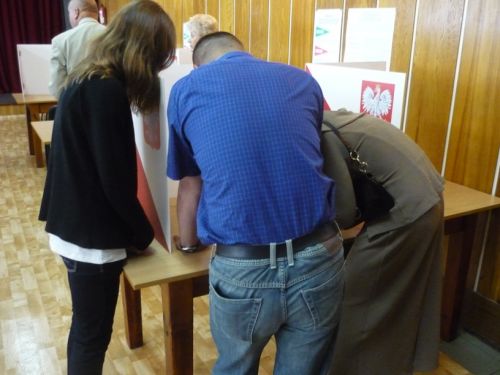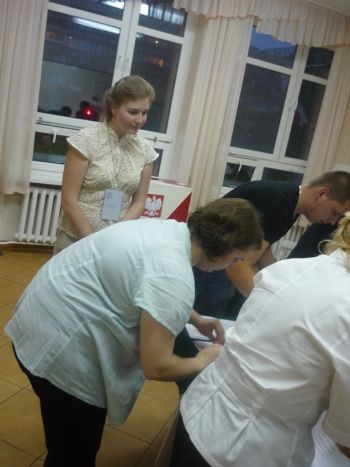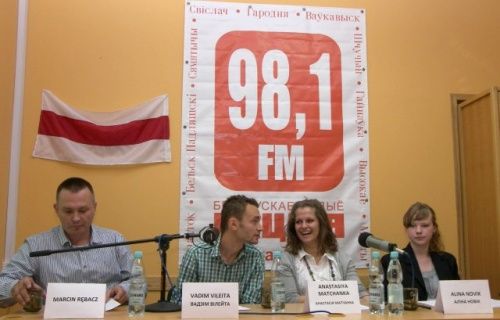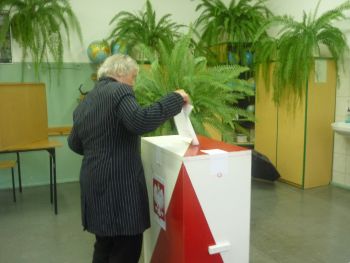The project participant managed to visit 171 polling stations in Białystok and the Podlaskie voivodeship. They were officially registered as international observers by the National Election Commission.
The observation was based on the provisions of the national legislation of Poland as well as international standards.
“The election was held in accordance with international principles and national legislation,” said the mission evaluation report.
Family is sacred
Nevertheless, the observers, majority of who were EHU students and young representatives of Belarusian NGOs, uncovered several deviations from international principles of the free and fair election conduct.
“The most common deviation is voting together of an entire family. In Poland [family voting] is a norm,” Anastasiya Matchanka from United Centre of Initiatives for Belarus (JuBIC, Lithuania) said.
 Family voting is not such an innocent deviation. It is not a secret, that this way one of spouses could control a choice of another: not wanting to create a conflict a husband or wife would rather vote the way his or her significant other wishes. When polling station officials do not see the necessity to direct a family to different polling booths, this practice could potentially alter vote results in final protocols.
Family voting is not such an innocent deviation. It is not a secret, that this way one of spouses could control a choice of another: not wanting to create a conflict a husband or wife would rather vote the way his or her significant other wishes. When polling station officials do not see the necessity to direct a family to different polling booths, this practice could potentially alter vote results in final protocols.
Other procedural errors were also observed: widespread open voting (when a voter’s choice is clearly visible by everyone present); disorganisation and overcrowding at polling stations (especially after a mass in adjacent churches voters started to pour inn); absence at numerous polling stations necessary equipment for a disabled persons access.
“I wish we had these deviations”
Despite numerous procedural omissions, overall Belarusian observers were quite satisfied with the Polish election. As the evaluation report stated there was no voting in advance, during which it was so convenient to falsify the results.
In Poland there were no lavish buffets where alcohol at low prices was sold.
And most importantly, there was no doubt that numbers in final protocols were 100% reflective of the actual vote. The vote count was open and transparent, conducted under a watchful eye of the observers. Polling station officials and observers respected each other and did not interfere with each other’s work staying satisfied with what was being done.
 Natallia Yakauleva (on photo), a mission participant from Babrujsk (South Belarus), who had observed the Belarusian municipal election in April, could not hold back her emotions during the vote count at polling precinct #44 in Białystok: “I am on the seventh heaven! This is how ballots should be counted! And it is only 50 km from the Belarusian border…”
Natallia Yakauleva (on photo), a mission participant from Babrujsk (South Belarus), who had observed the Belarusian municipal election in April, could not hold back her emotions during the vote count at polling precinct #44 in Białystok: “I am on the seventh heaven! This is how ballots should be counted! And it is only 50 km from the Belarusian border…”
The observer could not believe that polling station officials did not mind her standing right in front of a table, where votes were counted, scrutinising and photographing every ballot, every protocol. Officials gave answers to every question the observers posed. All number, ballots and signatures, reconciled at the end – there were no grounds to mistrust the validity of final results.
“Now I feel ashamed for our, Belarusian, election organisers,” Natallia said in despair, remembering how in her own country at a polling station she had to deal with boorishness and harassment by officials during a completely sealed off and secretive vote count.
With support of local Belarusians The premise that Belarusians had to try hard in order to hold elections on a level with Poland was time and time again stressed at the final press-conference on the day after the election. Radio Racyja, a Belarusian radio station of Biełystok where the press-conference took place, along with Educational Centre Polska-Białoruś were the main mission partners in Poland.
The premise that Belarusians had to try hard in order to hold elections on a level with Poland was time and time again stressed at the final press-conference on the day after the election. Radio Racyja, a Belarusian radio station of Biełystok where the press-conference took place, along with Educational Centre Polska-Białoruś were the main mission partners in Poland.
They helped to find election experts in Warsaw, where the observers spent their first day in Poland. And they also organised a meeting with the Białystok regional election commission.
Polish mass media paid a great deal of attention to the observation mission – local TV station featured reports about the process of observation, final mission results and recommendations were highlighted by news agencies and Internet portals.
The arrival of Belarusians accompanied by Lithuanians and Swedes interested Poland mainly because both an international and local observations were something very rare and even exotic. The mission organisers hoped that they managed to engage Poles to start reviewing their election legislation and also begin their own, local, observation efforts.
Grounds for comparison
The observation mission, despite an average age of its participants, had quite enough experience to judge expertly the election in Poland. The Election Observation: Theory and Practice project had previously organised missions in various countries of the region: Belarus, Ukraine, Lithuania, Georgia. Belarusian youth even went twice to Norway, where a parliamentary debate began on chances of the election legislation as a result of their findings.
The project will continue and its organisers have plans to observe upcoming elections in Bosnia and Herzegovina, Latvia, and Sweden.
The Election Observation: Theory and Practice project is implemented jointly by the United Centre of Initiatives for Belarus (JuBIC), Swedish International Liberal Centre (Silc), European Humanities University (EHU) and Belarusian Human Rights House in Vilnius (HRH).
It is mostly focusing on bringing young Belarusians to monitor elections in different countries, mostly neighbouring ones, to gain some positive experience of election observation and democratic procedures. They are also accompanied by peers from Lithuania and Sweden.
The project is financed by the Norwegian MFA and Swedish International Liberal Centre.
Participants do not only observe elections, but have an intensive educational course, which is included in the EHU syllabus and is taught by lecturers from Belarus, Lithuania and Norway. After a successful completion of the course participants receive a special diploma of recognition.
Documents:





